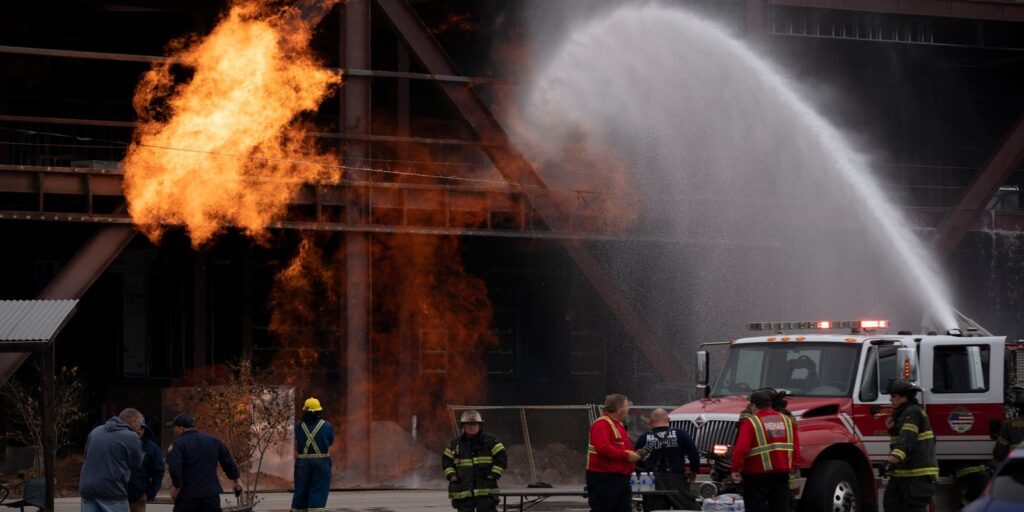Given that winter weather is when many people “smell” gas, let me take the time to remind you to please call your gas company or fire department to report this. It is free of charge; the pay off could mean saving a life or property.
Predicting Ruptures on Operating Pipeline
- 651 Dauntless Pkwy, Elmont, NY 11003
- propsystems25@yahoo.com
- (877) 710-7926

I Smell Gas
Winter weather conditions brings a large group of difficulties, and among them is the elevated familiarity with gas-related concerns. The particular scent related with flammable gas turns out to be more perceptible in colder months, making it urgent for people to perceive and answer expeditiously to any indications of a potential gas spill. This far reaching guide plans to give top to bottom bits of knowledge into the location of gas smells during winter, the significance of detailing gas spills, and proactive measures for forestalling possible risks. It underlines the cooperative job of people, gas organizations, and crisis administrations in guaranteeing the security of lives and properties.
Gas Scents and Expanded Mindfulness
Winter weather conditions presents a novel situation that can intensify the location of gas smells. As temperatures decrease, people will quite often invest more energy inside, depending on warming frameworks, ovens, and different gas machines to remain warm. It is during these chilly months that the unmistakable odorant added to petroleum gas turns out to be more noticeable, filling in as a vital mark of likely breaks.
The Smell of Petroleum gas
Petroleum gas itself is scentless, however an odorant called mercaptan is added to it, giving it an unmistakable “spoiled egg” smell. This deliberate expansion fills in as a security measure, permitting people to identify gas spills by their smell.
Normal Reasons for Gas Holes in Winter
A few variables add to the improved probability of gas spills during winter. Cold temperatures can make maturing pipelines contract and grow, possibly prompting breaks or weaknesses. Expanded use of gas apparatuses and warming frameworks puts extra weight on the foundation, making it fundamental for people to stay careful.
Significance of Brief Discovery
Brief discovery of gas smells is basic in forestalling possible risks. Gaseous petrol is profoundly combustible, and, surprisingly, a little break can prompt serious outcomes like flames or blasts. Perceiving the unmistakable scent and making a quick move is the principal line of protection in guaranteeing local area security.
The Source of inspiration: Detailing Gas Hole
Perceiving the smell of gas is just the initial step; the ensuing activity of announcing the gas spill is similarly essential. Numerous people might wonder whether or not to settle on the decision because of vulnerability or worries about bother. Nonetheless, it is fundamental to comprehend that revealing gas smells isn’t just a capable activity yet additionally a possibly life-saving one.
Who to Contact
In case of identifying a gas smell, people ought to contact their gas organization or neighborhood local group of fire-fighters right away. Revealing a gas spill is a for nothing administration given by gas organizations, and the reaction is quick to address potential security concerns.
Gas Organization Crisis Hotline
Gas organizations have crisis hotlines explicitly assigned for revealing gas spills. These hotlines are staffed all day, every day, underscoring the obligation to guaranteeing a quick reaction to any likely occurrences. People ought to really get to know the crisis hotline number of their gas supplier and store it in a promptly open area.
Local group of fire-fighters Contact
In circumstances where reaching the gas organization may not be quickly attainable, connecting with the neighborhood local group of fire-fighters is another option. Firemen are prepared to deal with gas-related crises and can survey what is happening to guarantee the wellbeing of the local area.
Data to Give
While revealing a gas spill, people ought to give explicit data to help crisis responders. This might incorporate the area of the gas smell, any perceptible murmuring sounds, and perceptions of actual harm to gas lines or machines. Clear and exact data empowers a more productive and designated reaction.
The Result: Saving Lives and Properties
The choice to report a gas release, regardless of whether it appears to be minor, can have significant ramifications for local area security. The potential result incorporates saving lives, forestalling property harm, and adding to the general prosperity of the local area. Grasping the weightiness of the circumstance and perceiving the aggregate liability to focus on security highlights the significance of this straightforward yet effective activity.
Forestalling Horrendous Occurrences
Gas spills, whenever left neglected, can grow into disastrous occurrences. The exceptionally combustible nature of gaseous petrol makes it basic to speedily address even the smallest sign of a break. Detailing gas smells permits gas organizations and crisis administrations to intercede before a little issue changes into a critical and possibly crushing occasion.
Safeguarding Lives and Wellbeing
Gaseous petrol, when delivered into encased spaces, can dislodge oxygen, prompting what is happening. Furthermore, the ignition of flammable gas produces carbon monoxide, a boring and scentless gas that can present serious wellbeing gambles. Detailing gas spills forestalls openness to these risks, safeguarding the lives and soundness of people locally.
Forestalling Property Harm
Gas-related occurrences, like flames or blasts, can bring about broad property harm. Brief revealing of gas smells permits crisis responders to go to preventive lengths, alleviating the gamble of property harm and safeguarding the actual prosperity of homes and designs.
Local area Strength and Readiness
Developing a culture of revealing gas spills adds to local area flexibility and readiness. Mindfulness and ideal activity engage people to effectively take part in guaranteeing the wellbeing of their areas. This aggregate exertion fortifies the general limit of networks to answer successfully to gas-related crises.
Proactive Measures for Winter Gas Security
While revealing gas smells is a urgent responsive measure, finding a way proactive ways to improve winter gas wellbeing is similarly significant. People, gas organizations, and networks can team up to execute preventive estimates that decrease the probability of gas releases and improve in general security during the colder months.
Routine Support and Investigations
Gas organizations assume a fundamental part in guaranteeing the trustworthiness of gas framework. Customary support and assessments of pipelines, valves, and gas apparatuses are fundamental to distinguish expected weaknesses before they raise. People ought to likewise plan routine reviews of their home gas frameworks to expeditiously resolve any issues.
Training and Mindfulness Projects
Gas organizations can participate in instructive drives to bring issues to light about winter gas security. Instructive missions can remember rules for perceiving gas smells, the significance of brief revealing, and best practices for utilizing gas machines during winter. Local area studios and effort programs add to a very much educated and proactive people.
Innovation Driven Checking Frameworks
Progressions in innovation offer creative answers for observing gas foundation. Gas organizations can put resources into innovation driven checking frameworks that give continuous information on gas stream, tension, and likely breaks. These frameworks empower quick intercession and improve the general versatility of gas foundation.
Local area Crisis Reaction Plans
Cooperative endeavors between gas organizations and neighborhood networks can prompt the improvement of local area crisis reaction plans. These plans frame clear strategies for answering gas-related episodes, including departure courses, crisis contact data, and coordination with crisis administrations. Practice drills and reenactments further get ready networks for expected crises.
Climate Versatile Foundation
Perceiving the effect of winter weather conditions on gas framework, gas organizations can put resources into climate tough materials and development procedures. This proactive methodology limits the effect of temperature variances on pipeline respectability and lessens the probability of winter-related weaknesses.
Public-Private Organizations
Public-private organizations between gas organizations, administrative bodies, and neighborhood states encourage a cooperative way to deal with winter gas security. By sharing assets, mastery, and data, partners can all in all address difficulties, carry out prescribed procedures, and upgrade the general security of gas framework.
Impetuses for Home Redesigns
Gas organizations can offer motivators for property holders to redesign their gas machines to additional energy-proficient and more secure models. This urges people to put resources into current machines with improved security highlights, decreasing the general gamble of gas-related occurrences.
Local area Commitment Drives
Gas organizations can effectively draw in with networks through drives like official Q&A events, wellbeing courses, and instructive occasions. Building a compatibility with occupants cultivates open correspondence and urges people to report gas smells immediately. Gas organizations can likewise look for criticism from networks to persistently further develop security measures.
Conclusion
As winter weather conditions brings the uplifted familiarity with gas smells, the aggregate liability of people, gas organizations, and crisis administrations becomes vital in guaranteeing local area wellbeing. The particular smell of flammable gas fills in as a pivotal advance notice sign, and the choice to report gas spills is a straightforward yet strong activity with possibly life-saving outcomes. Understanding the significance of brief location, the particular moves toward take while detailing gas smells, and the possible result as far as saving lives and properties highlights the gravity of this obligation. Winter gas security stretches out past receptive measures and envelops proactive endeavors to forestall gas spills, improve framework flexibility, an
